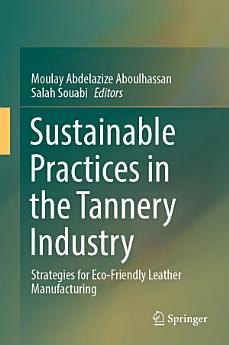Sustainable Practices in the Tannery Industry: Strategies for Eco-Friendly Leather Manufacturing
About this ebook
This book offers an approach to decouple economic growth from resource overuse, thereby combating climate change. It guides businesses in managing the production process with a focus on recycling water and product components, such as chromium, which is highly toxic. Integrated management methods, including the application of consumption ratios and adherence to standards like ISO management systems, are highlighted.
Given the complexity and cost of treatment technologies, prioritizing best practices and preventive measures is essential to reduce liquid and solid waste production. The book also underscores the advantages of clean technologies in curbing water and chemical usage.
In summary, this resource empowers tanneries to operate more efficiently and sustainably, fostering responsible economic development.
About the author
Professor Abdelazize Aboulhassan holds a PhD in Science and Technology from Hassan II University, Faculty of Science and Technology Mohammedia, with a specialization in water treatment. An accomplished researcher, he has published over 45 peer-reviewed articles in indexed journals. He is currently a professor at the National School of Applied Sciences (ENSA), Ibn Zohr University, Morocco. In addition to his teaching role, Professor Aboulhassan serves as the Director of the Laboratory of Mechanic Process Energy and Environment. His research interests include water and waste treatment, wastewater plant operations, leachate treatment, solid waste valorization, and landfill management. From 2016 to 2021, he led the Process and Environmental Engineering program and currently chairs the Process Engineering Department at ENSA Agadir. Widely recognized as a national expert, Professor Aboulhassan also serves as a reviewer for numerous scientific journals.
Dr. Salah Souabi is a Professor at Hassan II University of Casablanca, Morocco, Faculty of Science and Technology Mohammedia, Laboratory of Process and Environmental Engineering. He holds a PhD in water chemistry and microbiology from the University of Poitiers, France, and a PhD in water treatment from Moulay Ismail Maknes University, Morocco. Professor Salah Souabi treats liquid and solid waste in a team. He is an expert in several scientific journals in environmental sciences. Mr. Souabi has participated in several waste management projects and recovery projects. He has adequate experience in water, wastewater, waste management,
environmental pollution, and the realization of various R&D projects. Professor Souabi has participated in several industrial projects to manage and recover liquid and solid discharges. He is responsible for the engineering and Mastar Water and Environmental Engineering courses. He is an expert at the level of several international newspapers. Professor Souabi has supervised 28 doctoral students for PhD degrees in water, wastewater treatment, environmental pollution, solid waste management, and wastewater treatment plant operations and sustainability. He has published 165 peer-reviewed articles, 30 book chapters, 11 edited books,
and 310 communications.






